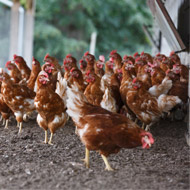Avian flu study offers new insights

Researchers analysed the specific properties that enable some strains of H9N2 to adapt for successful human infection.
How the most common type of avian influenza virus, H9N2, is able to infect humans has been identified by researchers at the Pirbright Institute.
While considered less pathogenic than some forms of avian flu virus, H9N2 viruses still cause significant losses for the poultry industry in many countries - particularly Asia, the Middle East and North Africa.
In Hong Kong, China, Bangladesh and Egypt the number of human infections of H9N2 has been on the rise. Although these infections have been mild, concerns increased when tests revealed its potential for human-to-human airborne transmission - a property normally associated with the potential to cause pandemic.
In a study, published in Nature’s Emerging Microbes & Infections, researchers analysed the specific properties that enable some strains of H9N2 to adapt for successful human infection. They found that bird flu strains can infect humans when a mutation occurs that enables a preference for binding receptors that are ‘human-like’.
The researchers also assessed how the stability of H9N2 haemagglutinins affects the PH of fusion. To infect humans, the haemagglutinin must be stable enough to survive in respiratory droplets for airborne transmission.
The H9N2 strains were found to possess haemagglutinins which were stable at lower pH levels - something which was mirrored in other bird flu strains which have adapted to infect humans in the past. The team established that the stability at a lower pH was a more important factor for virus fusion than the preference for binding to different receptors.
“Based on the two properties we tested, our results indicate that the lineages with the highest zoonotic potential may be those currently circulating in southern China and Vietnam (G1 ‘Eastern’ sub-lineage),” commented Dr Munir Iqbal, lead author of the study.
“However, evaluations in this study of the lineages prevalent in China and Vietnam (BJ94) and from Bangladesh to Morocco (‘Western’ G1 sub-lineage), suggest these viruses could also adapt to humans with relatively few additional mutations and merit further research.”
“This study has provided us with some important new insights which are helping us develop our understanding of these influenza viruses from molecular, biophysical and virological perspectives. We hope this will inform risk assessments of their zoonotic and pandemic potential and help improve global vaccine strategies”.



 The latest
The latest